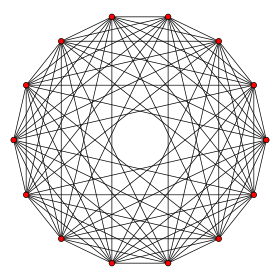| Regular 7-orthoplex (heptacross) | |
|---|---|
 Orthogonal projection inside Petrie polygon | |
| Type | Regular 7-polytope |
| Family | orthoplex |
| Schläfli symbol | {35,4} {3,3,3,3,31,1} |
| Coxeter-Dynkin diagrams | |
| 6-faces | 128 {35} |
| 5-faces | 448 {34} |
| 4-faces | 672 {33} |
| Cells | 560 {3,3} |
| Faces | 280 {3} |
| Edges | 84 |
| Vertices | 14 |
| Vertex figure | 6-orthoplex |
| Petrie polygon | tetradecagon |
| Coxeter groups | C7, [3,3,3,3,3,4] D7, [34,1,1] |
| Dual | 7-cube |
| Properties | convex, Hanner polytope |
In geometry, a 7-orthoplex, or 7-cross polytope, is a regular 7-polytope with 14 vertices, 84 edges, 280 triangle faces, 560 tetrahedron cells, 672 5-cells 4-faces, 448 5-faces, and 128 6-faces.
It has two constructed forms, the first being regular with Schläfli symbol {35,4}, and the second with alternately labeled (checkerboarded) facets, with Schläfli symbol {3,3,3,3,31,1} or Coxeter symbol 411.
It is a part of an infinite family of polytopes, called cross-polytopes or orthoplexes. The dual polytope is the 7-hypercube, or hepteract.